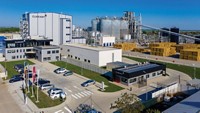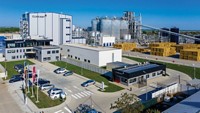Advertisement
Grab your lab coat. Let's get started
Welcome!
Welcome!
Create an account below to get 6 C&EN articles per month, receive newsletters and more - all free.
It seems this is your first time logging in online. Please enter the following information to continue.
As an ACS member you automatically get access to this site. All we need is few more details to create your reading experience.
Not you? Sign in with a different account.
Not you? Sign in with a different account.
ERROR 1
ERROR 1
ERROR 2
ERROR 2
ERROR 2
ERROR 2
ERROR 2
Password and Confirm password must match.
If you have an ACS member number, please enter it here so we can link this account to your membership. (optional)
ERROR 2
ACS values your privacy. By submitting your information, you are gaining access to C&EN and subscribing to our weekly newsletter. We use the information you provide to make your reading experience better, and we will never sell your data to third party members.
Biobased Chemicals
Clariant is latest firm to pull out of cellulosic ethanol
The firm will close its demonstration plant and lay off related staff in Romania and Germany
by Craig Bettenhausen
December 8, 2023

The specialty chemical maker Clariant has become the latest company to abandon plans to commercialize cellulosic ethanol. The Swiss firm is closing its cellulosic ethanol plant in Podari, Romania, and will cease most operations by the end of the year.
The Podari site was built as a flagship and demonstration facility for the company’s cellulosic ethanol technology. Most of the firm’s employees working on the business line, both in Romania and Germany, will lose their jobs.
Clariant’s process, which it calls Sunliquid, uses fungal enzymes to break down cellulosic biomass—wheat straw in the case of the Podari plant—into sugars and starches that are then fermented into ethanol by yeast. Though the company sold a handful of licenses for the technology, it struggled to get its own plant ramped up to the nameplate capacity of 63 million L per year.
Neither Clariant nor any of the Sunliquid licensees that C&EN contacted responded to requests for comment by deadline. Clariant press releases describe two licensing deals for plants in China and one each in Bulgaria, Poland, and Slovakia. If those projects advance as planned, they will have a combined capacity of 254 million L. Clariant says it will retain the staff needed to maintain the technology and deliver on those contracts.
Clariant has been under investor pressure to abandon cellulosic ethanol, especially since declaring a $242 million loss late last year on the Podari plant, which cost $258 million to build. Indeed, the investment firm Jefferies praised the decision in an investor’s note. Though the closure will cost Clariant almost $227 million through 2024, Jefferies says, it will save the firm $40 million per year. “Ultimately, drawing a line in the sand on this project should be viewed as positive,” the note says.
The closure is the latest in a long history of failed attempts to commercialize cellulosic ethanol. US plants by DuPont, Abengoa, and a partnership of Poet and DSM all started up, struggled, and shut down between 2014 and 2019. The field has also seen successes. Brazil’s Raízen has operated a 34 million L plant since 2015, and the firm expects to complete three more in 2024. Similarly, Praj Industries opened a 30 million L plant in India last year and is working on four more; all are owned by state-run oil companies but constructed and operated by Praj.
The loss of the Podari plant will hurt, but not kill, the development of cellulosic ethanol, according to Brad Price, who leads technical due diligence for the project finance firm New Energy Risk. “It will certainly contribute to a raising of the bar for financial institutions to invest in similar projects,” he says.
“That said, the door is not closed on future project financing; lessons will have been learned and will need to be carefully integrated into future developments,” Price says. “Of course, it is always preferred to learn these lessons at a less capital-intensive scale.”





Join the conversation
Contact the reporter
Submit a Letter to the Editor for publication
Engage with us on Twitter